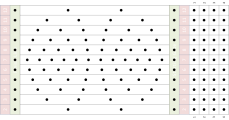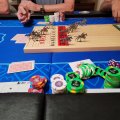I think I'm going to go the Blanton's horses route and build a simple board for em. Can someone check my thinking about the odds/numbers of holes in each late?
So the basic odds are easy. 1/36 for 2 & 12. 2/36 for 3 & 11, etc. If I multiply those odds by 2 then I get 2 holes for the 2 & 12 lanes, 4 holes for the 3 & 11 lanes, etc. So far, so good. That gives a layout like this.

The problem comes in that there's one extra hop needed to cross the finish line. So with this layout it actually takes three hops to win in the 2 lane, 5 hops to win the 3 lane. And that whacks the odds a bit. So I think I need to adjust the hole layout so that the actual number of hops are true-odds, right? But that would make the 7 lane way full of holes (would need total 18 hops so 17 holes in the middle). That seems like a lot. Plus I have this total anecdotal feeling when we've played that the 7 lane is a tougher win lane (completely illogical I know) so I kinda like the 7 lane being a little shorter than true odds.
Any thoughts?
So the basic odds are easy. 1/36 for 2 & 12. 2/36 for 3 & 11, etc. If I multiply those odds by 2 then I get 2 holes for the 2 & 12 lanes, 4 holes for the 3 & 11 lanes, etc. So far, so good. That gives a layout like this.

The problem comes in that there's one extra hop needed to cross the finish line. So with this layout it actually takes three hops to win in the 2 lane, 5 hops to win the 3 lane. And that whacks the odds a bit. So I think I need to adjust the hole layout so that the actual number of hops are true-odds, right? But that would make the 7 lane way full of holes (would need total 18 hops so 17 holes in the middle). That seems like a lot. Plus I have this total anecdotal feeling when we've played that the 7 lane is a tougher win lane (completely illogical I know) so I kinda like the 7 lane being a little shorter than true odds.
Any thoughts?


